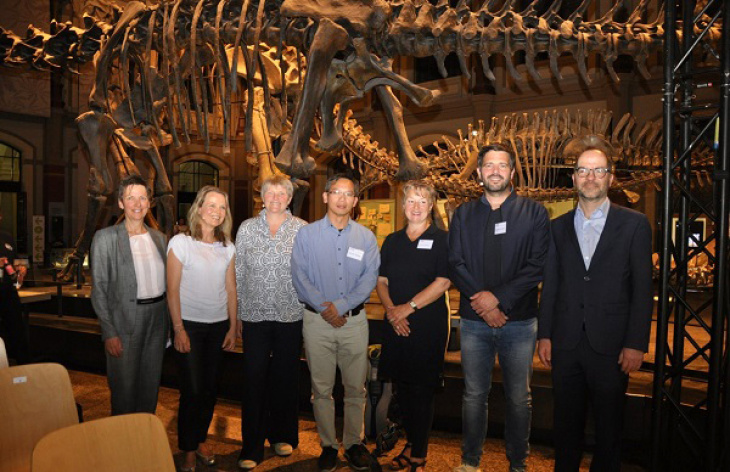Mud binds carbon
Over the past three years, the joint APOC project involving the Helmholtz-Zentrum Hereon has investigated how climate change and human exploitation pressure affect the carbon cycle in the North Sea. The project was jointly coordinated by the Alfred Wegener Institute - Helmholtz Center for Polar and Marine Research and the Helmholtz-Zentrum Hereon. The final event took place in Berlin and included an expert discussion with representatives from politics, society and science under the motto “Mud matters”.

From left to right: Silke Inselmann (Moderator, Widserve), Ute Wilhelmsen (DAM), Nadja Ziebarth (Head of the Marine Protection Office of BUND), Wenyan Zhang (Hereon), Sabine Kasten (AWI), Daniel Schneider (Member of the Bundestag, SPD, Spokesperson for the Marine Policy Parliamentary Group), Sebastian Unger (Federal Government Commissioner for the Marine Environment, BMUV). Photo: Tanja Glawatty
The joint project “Anthropogenic impacts on the cycling of particulate organic carbon in the North Sea” (APOC) was funded by the Federal Ministry of Education and Research (BMBF) as part of the MARE:N program “Oceans under stress - Analysis of marine CO2 uptake capacity” and under the umbrella of the research framework program “Research for Sustainable Development” (FONA). The researchers in the project, coordinated jointly by Prof Dr Sabine Kasten, sediment geochemist at the Alfred Wegener Institute and Dr Wenyan Zhang, ocean modeler at the Hereon Institute of Coastal Systems - Analysis and Modelling, investigated the importance of fine-grained sediments (mud) of the North Sea as a storage of particulate organic carbon (POC) and for the fixation of carbon/carbon dioxide and how this eco-system service is affected by global climate change and anthropogenic use pressure. Other participants included the GEOMAR Helmholtz Center for Ocean Research Kiel, the University of Hamburg and the marine protection office of BUND.
As part of the final event, which took place on 14 and 15 May at the Museum für Naturkunde - Leibniz Institute for Evolution and Biodiversity Research in Berlin, there was, among other activities, an expert open discussion organized by BUND, which focused on the following ques-tions: What are the latest research findings? How do we move from knowledge to action? What further research is needed? Do we need climate protection areas or carbon protection areas in the North Sea and the Baltic Sea in the future? How can such climate and carbon protection areas be implemented and established? How can the transfer from science to politics and the dialog between the groups involved be improved? All those experts involved in the discussion regard the work of the joint project as a great success.
Wenyan Zhang explained: “At Helmholtz-Zentrum Hereon, we were responsible for upscaling the impacts of human activities such as bottom trawling, offshore sand mining, sediment dredging and dumping, which were measured at some selected sites by our project partners, to the entire North Sea region through numerical modeling. We have identified clear impacts of human activities on organic carbon in the surface sediments of the seabed and investigated the underlying mechanisms. For example, we found a negative impact of bottom trawling on the carbon storage capacity of muddy seabed.” The results of the APOC project could support both national and international marine spatial planning to increase the CO2 storage capacity in the sediments of the shelf seas and thus contribute to climate protection.
Further information
Website Alfred-Wegener-Institut Webseite GEOMAR Website BUND Website Universität Hamburg Website Hereon Institute of Coastal Systems – Analysis and ModelingKontakt
Scientist
Helmholtz-Zentrum Hereon I Institute of Coastal Systems – Analysis and Modeling
Phone: +49 (0)4152 87-1568
Press Officer
Helmholtz-Zentrum Hereon I Communication and Media
Phone: +49 (0)4152 87-1648
